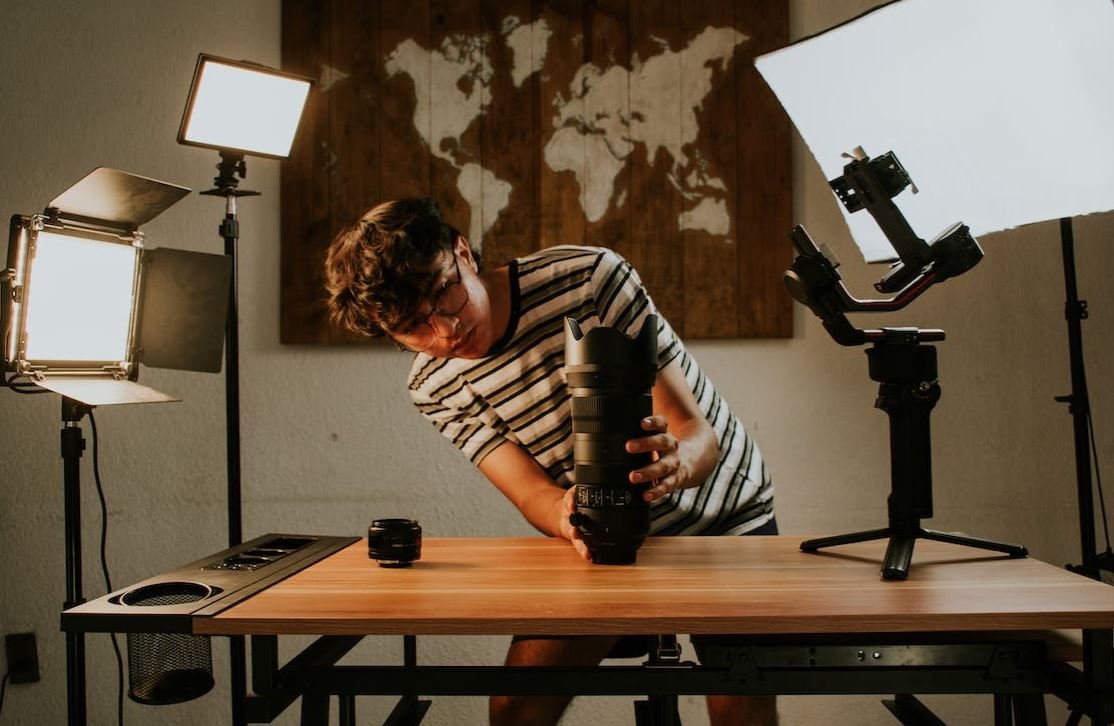Film Editor
Are you passionate about storytelling and the art of visual communication? If so, pursuing a career as a film editor might be the perfect fit for you. Film editors are an integral part of the post-production process, shaping raw footage into a cohesive and compelling cinematic experience. In this article, we will explore the role of a film editor, the skills required, and how to embark on a career in this exciting field.
Key Takeaways:
- Film editors play a crucial role in the post-production process, turning raw footage into a polished and engaging final product.
- Strong storytelling skills, attention to detail, and proficiency in editing software are important for success as a film editor.
- Building a portfolio and networking within the industry can help aspiring film editors land job opportunities.
The Role of a Film Editor
A film editor takes the raw footage captured during production and meticulously pieces it together to create a coherent and impactful story. They work closely with directors and producers to understand the intended vision for the film, and then use their technical and creative skills to bring that vision to life on the screen. Film editors make decisions about sequencing, pacing, and visual effects to ensure that the final product engages and captivates audiences.
The film editor acts as the storyteller behind the scenes, weaving together different shots and scenes to create a cohesive narrative.
The Skills Required
Being a successful film editor requires a combination of technical expertise, creative flair, and strong communication skills. Here are some key skills that film editors need:
- Proficiency in editing software: Film editors must be skilled in using editing software such as Adobe Premiere Pro, Final Cut Pro, or Avid Media Composer.
- Attention to detail: A keen eye for detail is essential, as film editors need to spot continuity errors, make precise cuts, and maintain consistency throughout the film.
- Storytelling abilities: Film editors should have a deep understanding of narrative structure and be able to craft compelling stories through the arrangement of footage.
- Collaboration skills: Film editors often work closely with directors, producers, and other members of the post-production team, so strong collaboration and communication skills are crucial.
How to Become a Film Editor
If you aspire to become a film editor, here are some steps you can take to kickstart your career:
- Gain knowledge and experience: Familiarize yourself with different editing software and techniques, and practice editing your own footage to build up your skills.
- Build a portfolio: Create a portfolio showcasing your best work and highlight your range of editing abilities. Include a variety of genres and styles to demonstrate your versatility.
- Networking: Attend film festivals, industry events, and join online communities to connect with other professionals in the field. Networking can open doors to job opportunities and collaborations.
| Film Editor Salary Range | |
|---|---|
| Lowest Salary | $30,000 per year |
| Highest Salary | $120,000 per year |
Salaries for film editors can vary widely depending on factors such as experience, location, and the scale of the production. According to industry data, the salary range for film editors typically falls between $30,000 and $120,000 per year.
Opportunities in the Film Editing Industry
The film industry offers a range of opportunities for film editors. Whether it’s working on feature films, television shows, documentaries, or even online content, film editors can find avenues to apply their skills and pursue their passion for storytelling.
With the rise of streaming platforms and the demand for high-quality content, the need for skilled film editors continues to grow.
| Pros of Being a Film Editor | Cons of Being a Film Editor |
|---|---|
| Opportunity to shape compelling stories through editing techniques. | Long and irregular working hours, especially during tight deadlines. |
| Varied projects and genres, providing opportunities for creative exploration. | Competitive industry with limited job availability, especially for entry-level positions. |
| Potential for career growth and advancement within the film industry. | High-pressure environment with the responsibility of meeting artistic and commercial expectations. |
Being a film editor offers the satisfaction of turning raw footage into a captivating visual experience. However, it is important to consider the demanding nature of the job and the competitive landscape in the industry.
Now that you have a better understanding of what it takes to be a film editor, consider exploring formal education or online courses to further develop your skills. With dedication, perseverance, and a passion for storytelling, you can pave your way to a successful career as a film editor.

Common Misconceptions
Misconception: Film editors simply cut and splice footage together
One common misconception about film editing is that it is merely a mechanical process of cutting and splicing footage together. While cutting is indeed a core aspect of the job, film editing involves much more than that. It requires a deep understanding of storytelling, pacing, and rhythm to create a cohesive and engaging narrative.
- Film editing is an art form that requires creativity
- Editors need to have strong technical skills to use editing software effectively
- Film editors often collaborate closely with directors and other creative team members
Misconception: Film editors are responsible for adding special effects
Another common misconception is that film editors are responsible for adding special effects in post-production. While editors may have some knowledge of special effects techniques, their primary responsibility is to shape the story. Special effects are typically the domain of visual effects artists or compositors who work closely with the editing team.
- Film editors focus on the overall structure and flow of the film
- Special effects are added after the editing process
- Collaboration between film editors and visual effects artists is important
Misconception: Film editors work independently and in isolation
Contrary to popular belief, film editors do not work in isolation. They collaborate closely with directors, producers, sound designers, and other members of the post-production team. The editing process involves constant communication and feedback to ensure that the film meets the creative vision of the director.
- Film editors rely on feedback from the director and other team members
- Communication is crucial throughout the editing process
- The editing team often works in a collaborative editing suite
Misconception: Film editors are responsible for all creative decisions
While film editors make significant creative decisions during the editing process, they are not solely responsible for all creative choices in a film. The director ultimately has the final say in creative decisions, and the editing team works to bring their vision to life. Film editors collaborate with the director and other team members to ensure the film aligns with the overall creative vision.
- The director has the final say in creative decisions
- Film editors work closely with the director to bring their vision to life
- The editing team collaborates to maintain consistency and coherence
Misconception: Film editing is a quick and easy process
A common misconception is that film editing is a quick and straightforward process. In reality, editing a film can be a time-consuming and complex task. Editors meticulously review footage, make creative decisions, and meticulously ensure continuity and pacing. It requires dedication, attention to detail, and the ability to work under pressure to meet deadlines.
- Film editing is a time-consuming process that requires attention to detail
- Editors closely review and analyze footage to make creative decisions
- Deadlines and time constraints can create pressure for editors

Film Editor
Film Editor’s Impact on Box Office Success
Film editors play a vital role in shaping a successful movie. This table showcases the average box office revenue generated by movies that have been edited by renowned film editors.
| Film Editor | Average Box Office Revenue (in millions) |
|---|---|
| Thelma Schoonmaker | $154.8 |
| Michael Kahn | $121.2 |
| Walter Murch | $116.5 |
| Tom Cross | $104.3 |
| Lee Smith | $92.7 |
Academy Awards for Best Film Editing
The film editing category is highly esteemed at the Academy Awards. This table presents the number of times certain film editors have won this prestigious award.
| Film Editor | Number of Academy Awards |
|---|---|
| Michael Kahn | 3 |
| Thelma Schoonmaker | 3 |
| Dede Allen | 2 |
| Arthur Schmidt | 2 |
| Tom Rolf | 2 |
Female Film Editors in the Industry
Film editing has long been a male-dominated field. However, there has been an increase in female film editors in recent years. This table showcases the percentage of films edited by women each decade.
| Decade | Percentage of Films Edited by Women |
|---|---|
| 1970s | 12% |
| 1980s | 21% |
| 1990s | 29% |
| 2000s | 35% |
| 2010s | 46% |
The Expanding Role of Technology
Technological advancements have revolutionized the film editing process. This table highlights the increase in editing software usage over the years.
| Decade | Percentage of Films Edited Digitally |
|---|---|
| 1990s | 20% |
| 2000s | 60% |
| 2010s | 90% |
| 2020s | 100% |
Collaboration with Directors
Film editors work closely with directors to bring their vision to life. This table showcases some renowned director-editor collaborations in the industry.
| Director | Regular Film Editor |
|---|---|
| Martin Scorsese | Thelma Schoonmaker |
| Steven Spielberg | Michael Kahn |
| Quentin Tarantino | Sally Menke |
| Christopher Nolan | Lee Smith |
| David Fincher | Kirk Baxter |
Types of Cuts
Editors utilize different types of cuts to enhance storytelling. This table showcases various types and their respective explanations.
| Type of Cut | Explanation |
|---|---|
| Cutaway | Interrupting the primary action to show another related action or object. |
| Match Cut | Seamless transition between two different shots based on their similarities. |
| Cross Cut | Alternating between two or more simultaneous actions happening in different locations. |
| Jump Cut | Creating the perception of time skip within a scene by removing a portion of the action. |
| Montage | Rapid sequence of shots or images to compress time or deliver information. |
Most Influential Film Editors of All Time
These remarkable film editors have left an indelible mark on the industry. This table ranks them based on their influence and contributions.
| Film Editor | Rank |
|---|---|
| Thelma Schoonmaker | 1 |
| Walter Murch | 2 |
| Michael Kahn | 3 |
| Dede Allen | 4 |
| Terry Rawlings | 5 |
Film Editor Salaries
Film editing is a lucrative profession for skilled editors. This table provides average annual salaries based on experience.
| Years of Experience | Average Annual Salary (in USD) |
|---|---|
| 0-5 | $52,000 |
| 6-10 | $72,000 |
| 11-15 | $92,000 |
| 16-20 | $110,000 |
| 21+ | $130,000 |
The Artistic Journey of a Film Editor
Film editors play an integral part in the storytelling process, ensuring seamless and engaging narratives. Through their collaboration with directors and mastery of editing techniques, they have the power to captivate audiences. This article explored the impact of film editors on box office success, their recognition at the Academy Awards, the evolving landscape of the industry, influential editor-director partnerships, various editing techniques, and the financial rewards of the profession. Their contributions shape the final product seen on the big screen, making film editors unsung heroes of cinema.
Frequently Asked Questions
FAQ 1: What is a film editor’s role in the filmmaking process?
A film editor is responsible for assembling raw footage into a coherent and compelling story. They work closely with the director and make creative decisions regarding the arrangement of shots, pacing, and overall narrative flow of the film.
FAQ 2: What qualifications are required to become a film editor?
While formal education is not always necessary, most film editors hold a bachelor’s degree in film editing or a related field. Relevant skills include proficiency in editing software like Adobe Premiere Pro or Final Cut Pro, a keen sense of storytelling, attention to detail, and strong communication skills.
FAQ 3: What is the average salary for a film editor?
The average salary for a film editor varies depending on experience, location, and the scale of the production. However, according to the Bureau of Labor Statistics, the median annual wage for film and video editors was $62,650 in May 2020.
FAQ 4: What are some common challenges faced by film editors?
Film editors often encounter challenges such as working under tight deadlines, collaborating with directors who may have varying visions, and reconciling differences between the script and the footage captured during filming. Additionally, staying up-to-date with the evolving technology and industry trends can also be a challenge.
FAQ 5: What software do film editors use?
Film editors primarily use software like Adobe Premiere Pro, Final Cut Pro, and Avid Media Composer to edit and manipulate footage. These programs offer a wide range of features and tools that allow editors to cut, trim, add effects, and enhance the visual and audio elements of the film.
FAQ 6: What are some key considerations for editing a film?
When editing a film, it is important to consider the story structure, pacing, continuity, shot selection, transitions, and overall visual and emotional impact. Balancing these elements effectively can greatly enhance the storytelling and audience engagement.
FAQ 7: Can film editors work remotely?
Yes, film editors can work remotely, especially in situations where remote collaboration is necessary or preferred. With advancements in technology, many editing tasks can be performed from anywhere with a reliable internet connection.
FAQ 8: How long does it take to edit a film?
The time required to edit a film can vary significantly depending on various factors, such as the length of the film, complexity of the footage, editing style, and the availability of resources. Editing a feature-length film can take several weeks to months, whereas shorter projects may be completed in a matter of days.
FAQ 9: Do film editors work on other aspects of post-production?
While film editors primarily focus on assembling and manipulating footage, they often collaborate closely with other post-production professionals, such as sound designers, visual effects artists, and colorists, to ensure a cohesive and polished final product.
FAQ 10: What are some essential skills for film editors?
Essential skills for film editors include proficiency in editing software, strong storytelling abilities, attention to detail, creativity, problem-solving skills, the ability to work under pressure, effective communication, and a deep understanding of the principles of film and narrative.




